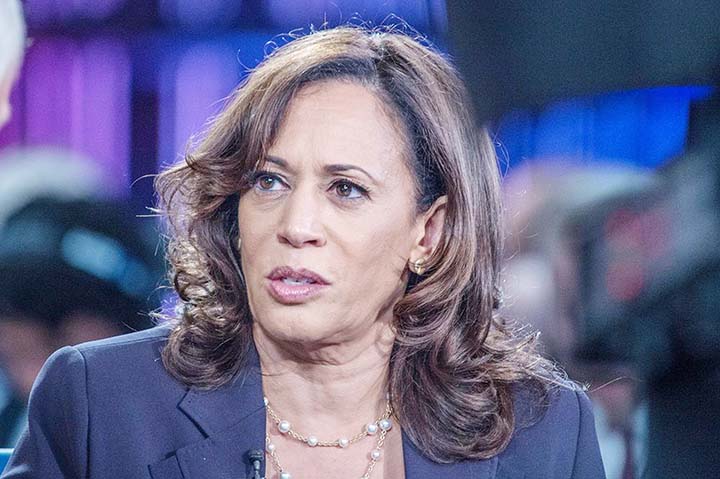
Kamala Harris made a splash with her well-received presidential campaign rollout in January, only to see her candidate-of-the-month status deflate as she struggled for a breakout moment on the trail.
Thanks to a rock-solid performance Thursday in the first Democratic debate of the 2020 cycle, the US senator from California has now catapulted back into the top tier.
Her suddenly viable candidacy is noteworthy in the era of Donald Trump: as a black American daughter of immigrants, Harris may well be the American dream incarnate, mounting a challenge to a president whom many Democrats denounce as the nation’s divider in chief.
Harris is 54, a former prosecutor and one time attorney general for California whose sometimes steely demeanor can give way to a million-watt smile.
Both countenances were on display in the debate – the most watched Democratic debate ever – where she was the best storyteller on stage, mixing policy proficiency with a knack for personal connection.
“We need to think about this situation in terms of real people,” Harris said when discussing the migrant border crisis. Harris owned the evening’s most powerful moment, when she boldly confronted frontrunner Joe Biden on race and identity and called out his “hurtful” comments in praise of segregationist senators with whom he worked but disagreed.
She also chided Biden on his past opposition to 1970s busing programs that forced integration of segregated schools – eloquently invoking her own childhood.
“There was a little girl in California who was part of the second class to integrate her public school, and she was bused to school every day,” she said. “And that little girl was me.” Harris, if elected, would become the first female – and first black female – president of the United States.
As someone who seems to personify America’s melting-pot ideal, she is no novice at breaking through glass ceilings.
After two terms as district attorney of San Francisco (2004-2011), she was twice elected as California attorney general (2011-2017), becoming the first woman and the first black person to serve as chief law enforcement officer of the nation’s most populous state.
Then in January 2017, she took the oath of office as US senator, making her the first woman of South Asian descent (her mother is a Tamil Indian) and only the second black woman senator in US history, after Carol Moseley Braun.
Her focused and often tough-sounding lines of questioning during closely watched Senate hearings – including that of controversial Supreme Court future justice Brett Kavanaugh – raised her profile last year ahead of her presidential bid.
Harris often proudly recalls her past as a prosecutor when she fought big banks in the midst of the financial crisis in order to benefit Californians.
She casts herself as a defender of middle class families “living paycheck to paycheck” and denounces police brutality and the killing of unarmed black men.
The daughter of immigrants – her father is from Jamaica – Harris grew up in the 1960s in the progressive hotbed of Oakland, California, proud of the struggle her parents waged for civil rights.
“My mother was the strongest person I have ever known,” she has written on Twitter.
Mother Shyamala was only 19 when she arrived in California in 1960 to pursue her studies, eventually becoming a renowned cancer researcher.
After her parents separated when she was about five years old, it was Kamala’s mother who raised her and her younger sister, Maya.
Hers was a happy childhood, Harris says, but she has also experienced discrimination.
“I have too many memories of my brilliant mother being treated as though she were dumb because of her accent,” she wrote in her memoir, “The Truths We Hold.”
She often has tough words about the Republican president Trump, whom she branded “the greatest national security threat to the United States” during the debate.
On the campaign trail, Harris is a mix of relaxed confidence and hustle.
Last week in Columbia, South Carolina between larger events she squeezed in time with two dozen women supporters including attorney Marguerite Willis, 69, who praised Harris’s experience in judicial, executive and legislative branches of government – as prosecutor, attorney general, and senator.
Deitra Matthews said she appreciates how Harris “has been grabbing the bullhorn” on criminal justice reform, and acting as a relentless optimist during trying times for Democrats.
“Once I got to know her a little bit more, I really started to see her as a tangible expression of hope,” the 41-year-old military wife said.
“I have not been this passionate about a candidate since 2007.”

